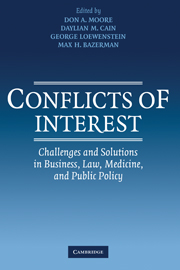Book contents
- Frontmatter
- Contents
- List of Contributors
- Acknowledgments
- Introduction
- PART ONE BUSINESS
- 1 Managing Conflicts of Interest within Organizations: Does Activating Social Values Change the Impact of Self-Interest on Behavior?
- 2 Commentary: On Tyler's “Managing Conflicts of Interest within Organizations”
- 3 A Review of Experimental and Archival Conflicts-of-Interest Research in Auditing
- 4 Commentary: Conflicts of Interest in Accounting
- 5 Bounded Ethicality as a Psychological Barrier to Recognizing Conflicts of Interest
- 6 Commentary: Bounded Ethicality and Conflicts of Interest
- 7 Coming Clean but Playing Dirtier: The Shortcomings of Disclosure as a Solution to Conflicts of Interest
- 8 Commentary: Psychologically Naive Assumptions about the Perils of Conflicts of Interest
- PART TWO MEDICINE
- PART THREE LAW
- PART FOUR PUBLIC POLICY
- Index
- References
4 - Commentary: Conflicts of Interest in Accounting
Published online by Cambridge University Press: 04 August 2010
- Frontmatter
- Contents
- List of Contributors
- Acknowledgments
- Introduction
- PART ONE BUSINESS
- 1 Managing Conflicts of Interest within Organizations: Does Activating Social Values Change the Impact of Self-Interest on Behavior?
- 2 Commentary: On Tyler's “Managing Conflicts of Interest within Organizations”
- 3 A Review of Experimental and Archival Conflicts-of-Interest Research in Auditing
- 4 Commentary: Conflicts of Interest in Accounting
- 5 Bounded Ethicality as a Psychological Barrier to Recognizing Conflicts of Interest
- 6 Commentary: Bounded Ethicality and Conflicts of Interest
- 7 Coming Clean but Playing Dirtier: The Shortcomings of Disclosure as a Solution to Conflicts of Interest
- 8 Commentary: Psychologically Naive Assumptions about the Perils of Conflicts of Interest
- PART TWO MEDICINE
- PART THREE LAW
- PART FOUR PUBLIC POLICY
- Index
- References
Summary
Mark Nelson has written a clear, interesting, and useful review of the research on conflict of interest in auditing. The review provides an insightful and critical review of a research literature that sheds light onto the role of conflicts of interest in auditing judgments, opinions, and reports. I see a number of noteworthy features of this chapter and of the research literature that it reviews. I will restrict my comment to three points, regarding (1) standards of proof; (2) selection of research participants; and (3) the relationship between researchers and professional accountants.
The first issue I want to raise has to do with standards of proof. In his review, Nelson mentions concern about the weight given to null results in the accounting literature on auditor bias. The chapter presents a number of articles that find no significant relationship between incentives and reports. As a rule, these papers have taken their null findings as evidence that no relationship exists. As a social scientist, I find this problematic. Personally, I have run more studies with null results than I care to admit, and most of them wind up in the trash because it is so difficult to know what to conclude from a null result – there is simply too much ambiguity. There are many ways to get a finding of no significant relationship between two variables, even when a relationship exists: small sample size, noisy data, bad measures, conservative statistical tests.
- Type
- Chapter
- Information
- Conflicts of InterestChallenges and Solutions in Business, Law, Medicine, and Public Policy, pp. 70 - 73Publisher: Cambridge University PressPrint publication year: 2005
References
- 2
- Cited by



